Kuwait backs Amman over all measures taken to preserve stability, security
AMMAN: A handout picture released by the Jordanian Royal Palace on March 1, 2021 shows Jordanian King Abdullah II speaking at the Jordanian Armed Forces' Command during his visit on the 65th anniversary of the Arabization of the Jordanian Army command in the capital. - AFPAMMAN: A top former Jordanian royal aide was among several suspects arrested Saturday as the army cautioned a half-brother of King Abdullah II against damaging the country’s security. Videos posted online showed a heavy police deployment in the Dabouq area near the royal palaces as the Washington Post said Prince Hamzah bin Hussein, who is also a former crown prince, was "placed under restriction” as part of a probe into an alleged plot to unseat the king.
"The move followed the discovery of what palace officials described as a complex and far-reaching plot,” it said, quoting a senior Middle East intelligence official. Hamzah is the eldest son of late King Hussein and his American wife Queen Noor. He has good relations officially with Abdullah and is a popular figure close to tribal leaders.
Prince Hamzah later said he is under house arrest, but denied being part of any conspiracy against his half-brother King Abdullah. In a video sent to the BBC, Prince Hamzah said the army chief of staff had visited him to tell him "I was not allowed to go out”, but the prince insisted he was not part of a conspiracy and was "not responsible for the breakdown in governance, the corruption and for the incompetence” in the running of the country.
The Kuwaiti Foreign Ministry on Saturday said the country is standing side by side with the Hashemite Kingdom of Jordan. Kuwait supports Jordan in all measures and decisions taken by King Abdullah bin Al-Hussein and Crown Prince Al-Hussein bin Abdullah to maintain security and stability of the kingdom, the ministry said in a statement. Stability and security of Jordan are an integrated part of Kuwait’s security and stability, the statement noted.
Neighboring Saudi Arabia also reacted swiftly to developments in Amman. "The kingdom stresses its full support for the Hashemite kingdom of Jordan... and for the decisions and measures taken by King Abdullah II and Crown Prince Hussein to safeguard security and stability,” it said.
King Abdullah had appointed his half-brother Hamzah crown prince in line with King Hussein’s dying wish, but in 2004 stripped him of the title and gave it to his own eldest son Hussein. The Washington Post said the alleged plot "included at least one other Jordanian royal as well as tribal leaders and members of the country’s security establishment”. US State Department spokesman Ned Price said Washington was "closely following” the reports. "We are... in touch with Jordanian officials. King Abdullah is a key partner of the United States, and he has our full support,” he said.
Jordan’s Joint Chiefs of Staff head, Major General Yousef Huneiti, denied media reports that Hamzah, who holds no official position, had been arrested. "What has been published about the arrest of Prince Hamzah is not true,” Huneiti said. But the prince had been "asked to stop some activities that could be used to shake the stability and security of Jordan”.
‘Security reasons’
Official news agency Petra named Bassem Awadallah, chief of the royal court in 2007-2008, and Sherif Hassan bin Zaid among an unspecified number of suspects arrested. Sherif is a title given to those close to the royal family in Jordan. The pair were detained for "security reasons” after a "close” operation, Petra said, quoting a security source.
Awadallah, a former finance and planning minister educated in the United States, was close to the king but has also been a controversial figure in Jordan. Before becoming royal court chief in 2007, he was head of the king’s cabinet in 2006. He had been a rising figure in Jordan playing a key role in pushing for economic reforms in the cash-strapped country until he resigned in 2008.
Awadallah stepped down after coming under public criticism over alleged interference in controversial political and economic issues. Saturday’s security sweep comes as Jordan prepares to mark 100 years since the new kingdom then named Transjordan was established alongside Palestine under British mandate. It declared independence in 1946, and despite having little oil wealth, severely lacking water and repeatedly being rocked by wars on its borders, Jordan has survived. But the centenary will be muted. Abdullah took the throne in 1999, on the death of his father Hussein, and has used the mottos "Jordan first” and "We are all Jordanians” to cement a national identity. – Agencies


